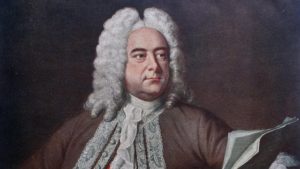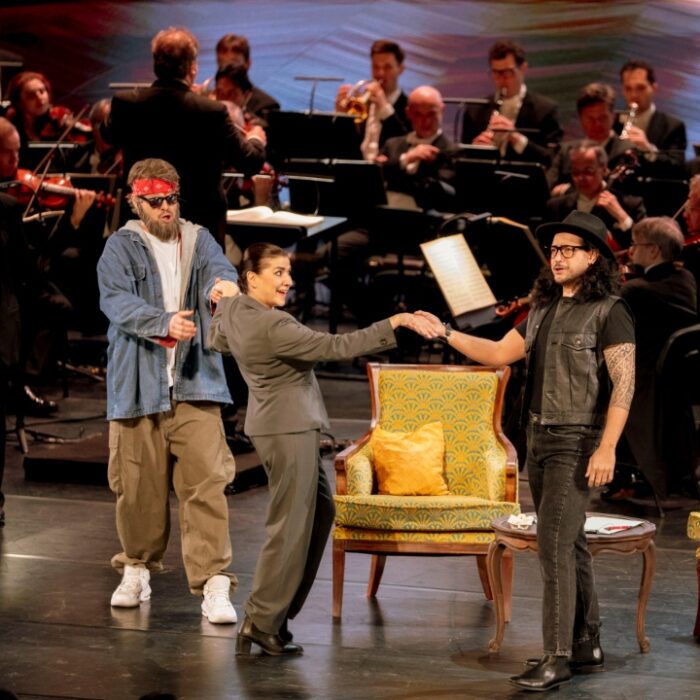
Concerto Köln & Monteverdi Choir Hamburg 2024 Review: Jephtha
By Mengguang Huang(Photo: Daniel Dittus)
“Jephtha” at the Elbphilharmonie Hamburg was nothing short of a revelatory experience, thanks to the exceptional artistry of Concerto Köln and the Monteverdi Choir Hamburg. Under the direction of Antonius Adamske, the orchestra breathed new life into Handel’s late masterpiece. The choir, equally impressive, delivered each passage with precision and emotional depth. While the soloists showed skill and commitment, they were sometimes overshadowed by the unparalleled brilliance of the orchestral ensemble, whose performance set an almost impossible standard.
Concerto Köln and Monteverdi Choir Hamburg: The Evening’s Heartbeat
From the very first notes of the energetic overture, Concerto Köln set a powerful tone, reaffirming their status as one of the world’s finest period ensembles. The strings sang with luminous clarity, their phrasing flowing naturally and imbuing even the most angular musical figures with purpose and grace. In “In gentle murmurs will I mourn,” the solo flute added a delicate, ethereal quality, perfectly capturing the aria’s mournful tone. The string section’s light touch in “Dull delay, in piercing anguish” heightened the subtle anguish of the piece, while in “His mighty arm with sudden blow,” the full, rich layers of strings created a powerful texture, their depth building intensity.
Perhaps most striking was the first violin’s echo of Iphis’s voice in”Happy they; this vital breath,” where the tender response added a haunting, almost reverential quality to the moment. Throughout, the seamless interplay between sections wove a vibrant, emotionally resonant soundscape, transforming Handel’s late oratorio into a vivid tapestry of profound emotional depth. Matching this brilliance, the Monteverdi Choir Hamburg infused each moment with power and warmth. Their handling of intricate fugues was exceptional, weaving a tapestry of sound with each vocal line entering with perfect precision. In “O God, behold our sore distress,” their dynamic shifts encapsulated both the despair and the flickering hope of the Israelites, their voices resonating with a palpable sense of collective emotion. Together, the orchestra and choir formed an indomitable force, their unity so powerful it often eclipsed the soloists, providing a foundation that was nothing short of extraordinary.
Jephtha: Lyrical Yet One-Dimensional
Icelandic tenor Benedikt Kristjánsson brought a deeply lyrical and introspective quality to the role of Jephtha, particularly in the tender aria “Waft her, angels, through the skies,” where his clear phrasing beautifully captured the character’s inner turmoil. However, in more assertive moments like “His mighty arm,” his voice struggled to rise above the orchestra’s rich texture. While his portrayal excelled in tenderness and vulnerability, it lacked the heroic weight the role demands, leaving his performance feeling somewhat one-dimensional compared to the dramatic intensity of the surrounding music.
Louise Kemény as Iphis: A Dedicated Effort
Soprano Louise Kemény portrayed Iphis with youthful sincerity and emotional depth, capturing both the innocence and the inner strength of her character. Despite facing vocal challenges throughout the evening, with constant moments of throat clearing during the pauses of arias, her tone remained bright and engaging. In “Farewell, ye limpid springs and floods,” she conveyed Iphis’s acceptance of her fate with a sense of quiet resignation.
Supporting Roles: Emotional Depth and Contrast
Henriette Gödde, Nicholas Tamagna, and Henryk Böhm each brought rich emotional depth to their respective roles. Gödde’s mezzo-soprano as Storgé conveyed a powerful blend of grief and dignity, while Tamagna’s tender sincerity as Hamor resonated with emotional vulnerability. Böhm’s steady authority as Zebul, grounded in his resonant bass-baritone, added gravitas to the performance. Together, they provided a nuanced contrast to the intensity of the central narrative, enriching the evening with their emotionally compelling portrayals.
Ultimately, this performance of “Jephtha” was not only a celebration of Concerto Köln’s extraordinary talent but also a testament to the invaluable contributions of Antonius Adamske, conductor of the Monteverdi Choir Hamburg. Each year, Adamske brings two or three carefully curated performances of lesser-known Baroque vocal masterpieces to Hamburg, selecting distinguished period ensembles and soloists who, while not always globally renowned, form a cohesive and powerful vocal ensemble under his direction. The dynamic and emotionally resonant interpretation by Concerto Köln, combined with the precision and intensity of the Monteverdi Choir, made for a truly unforgettable year-end celebration for Hamburg’s audience.



